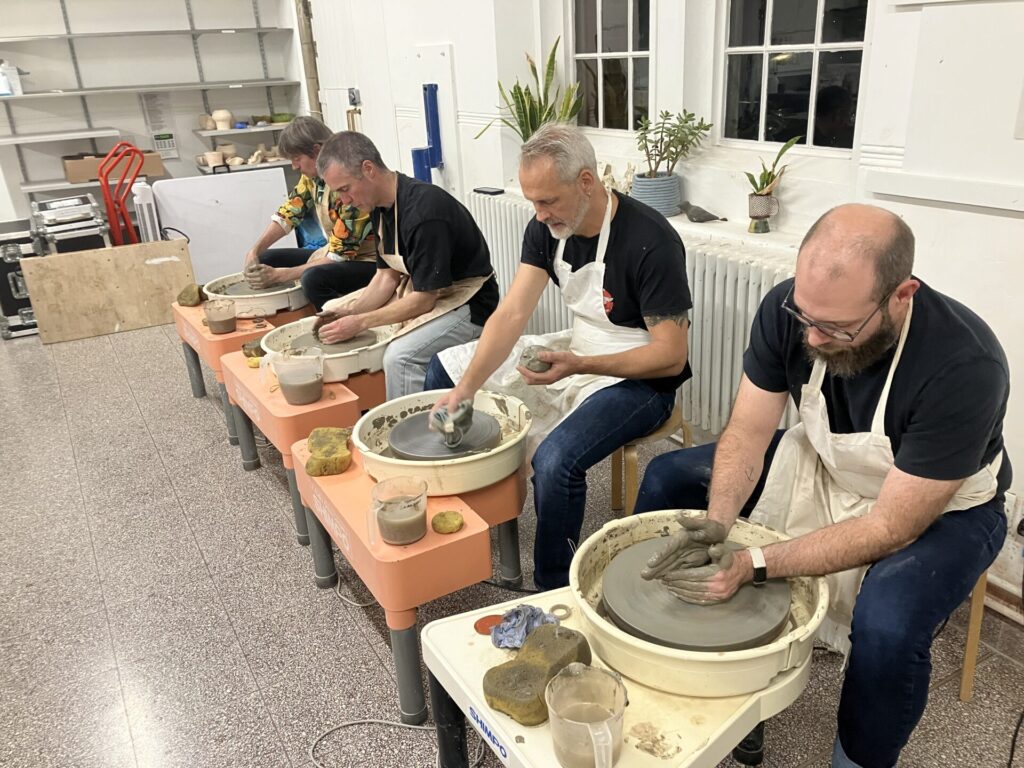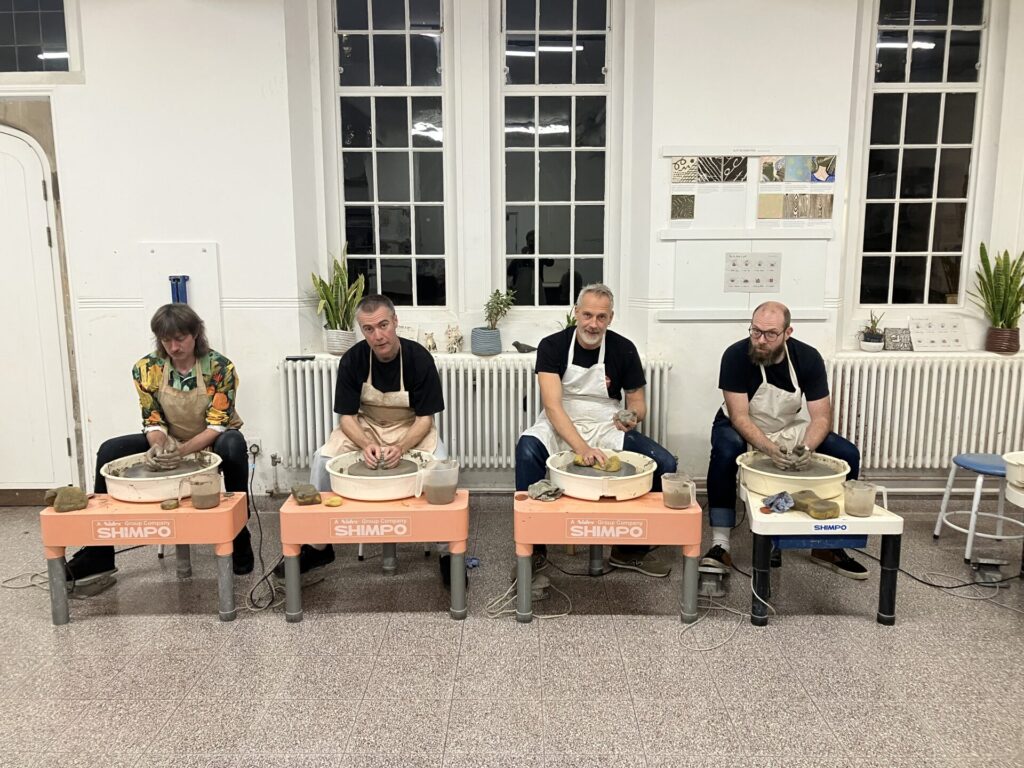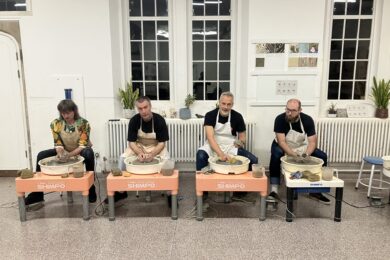It’s easy to see why throwing pots might appeal to Michael. The London quintet’s new album Nite Salad is physical, focused, and – in the manner of recent output from Sex Swing or Chat Pile – sticky. Over dark, gritty psych rock, Milo Brennan’s growled lyrics are strewn with references to repetitive manual work: “pour water, mix mortar” he howls on ‘Bronze Again Or’. The record has also required a good ceramicist’s time and patience, coming four years after their debut Tell Your Friends: a period in which their studio burned down, bassist David Silver suffered a prolapsed disc in his back, and three members of the band became fathers. Did these experiences inform Nite Salad’s grim reflections on the state of the nation, the “nutters of the industry” described in ‘Thank U’ as making a life in music untenable, or the wider ‘World Of Moan’ as one song calls it? Not sure – today we’re making pots.
I visit the band at Camden Art Centre which, like Michael, has ‘been through it’: a former library destroyed during the Blitz, then resurrected as a community arts hub where vocalist Milo Brennan and guitarist PJ Mountford now work. When I am waved a cheery, grey-handed hello by Brennan, Mountford, Silver and drummer Tamás Kiss – each under an apron, happily working away at making bowls to varying degrees of success – their pleasant disposition is, again, unsurprising. I’ve been writing for publications like tQ long enough to recognise that, for whatever reason, the darker, more brutal records tend to be made by gentler characters.
Between the runaway success of The Great Pottery Throwdown (a spin-off was launched this year in Silver’s native Canada), the legacy of arts and crafts’ regained popularity that came during lockdown, and a popular shift away from our culture of single-use items, throwing pots is big business. There’s also no shortage of fans from the music world, with Nick Cave putting on a new ceramics exhibition this year. While Mountford and Brennan have experience, Kiss and Silver are newcomers like myself. The band grab me an apron, some clay, invite me to sit at a wheel – the disc is spun by a motor activated by a foot pedal – and begin my first lesson.
The basics of pot-making
Tamás Kiss: You need to make a dense, egg-shaped ball. Whack it down in the centre of the disc, and while the disc is spinning, you compress and centralise it with water on your hands. You squeeze it in, pull it up, and it’s ashtray time.
PJ Mountford: By throwing it down, you create a seal. You want no air in the base at all, because when you fire it, it’ll crack. I remember making something really big, which I had to do in two parts so it could fit in the kiln – the technicians the next day were like “I’m so sorry, it exploded.” To get it off when you’re done, you slowly spin the wheel, take a wire – pushed flat to the disc – and pull it through the base. Then you leave it to dry overnight.
Kiss: You fire it in the kiln in different stages, at different temperatures. These kilns go up to 1700 degrees fahrenheit, it stays like that for half an hour, and that gradually comes down: the next day you come in and it’s just warm. There’s a little peeping hole, but you must not look in it, because if steam comes out? My eyes!
Making pots is an important part of Stoke’s history, and a lost art
Mountford: This should be in my DNA, because I’m from Stoke. I also worked at Armitage Shanks’ Twyford factory making toilets, as summer temping work. I just had to smash the moulds up though – you need to be skilled to actually build the toilets. We had one sledgehammer between two of us, and we just smashed moulds and smoked cigarettes.
In Stoke, there were a lot of bottle kilns which they fired pots in. A lot got destroyed, so it’s a lost art. But if you go to any terraced house in Stoke, they’ve got these beautiful toilet suites – these brown toilet suites with the bidets and everything. Even the poorest house has a full toilet suite.
The pot industry was destroyed, and that’s why Stoke’s a shithole now. That’s why I came to London – you do an art degree and just go work at a warehouse. But it’s making a bit of a comeback, and now you’ve got potbanks reopening.
Past efforts in ceramics have been a mixed bag
Milo Brennan: It’s quite shit, but it gets used a lot – there’s a little salt bowl that I gave my Mum. It’s very small and simple, black glaze on the outside and green glaze on the inside. It’s a bit shonky, but it’s nice because it’s full of salt all the time.
Mountford: I did a BTEC in design, and there was a ceramics course. I had these two teachers: Ron Mitchell who did the graphics – he made the KP Nuts logo in the 80s – and his wife Judith Mitchell ran the ceramics shop. I made this art-deco lamp, and stuck bits of corduroy to it for texture. I don’t know why I did that, I was 17.

Making pots is a lot like making music
Brennan: You can feel uncomfortable for a while with songs, you figure out stuff that doesn’t work, then some feeling comes along – like “ah, I can get into this.”
Kiss: In a band, though, you’re making one pot together, trying to shape it in a rehearsal room. Here, we’ve each got one individual piece of clay – it’s more like a solo project.
Brennan: It’s quite humbling to think you’re just a little part of a long journey – this constant dialogue between the universe and people.
David Silver: 50 years from now someone might buy this record, just thinking “Nite Salad? What the fuck is this?”
Brennan: Yes, a record becomes a strange artefact.
Whether pots or albums, it’s important to have an outlet.
Silver: In London I don’t do anything with my hands – you don’t get much time to just chill out and make something. I come from a little village in Saskatchewan, where people have a little more time to do stuff like this. There’s less of a rat race. I miss that.
Brennan: The world is very fucking bleak. To start a band can be a fun thing, but it’s reached a point where I’m not sure what I’d do without this outlet – this way of expressing my feelings about the state of things.
Michael’s new album Nite Salad is out now via Crackedankles



